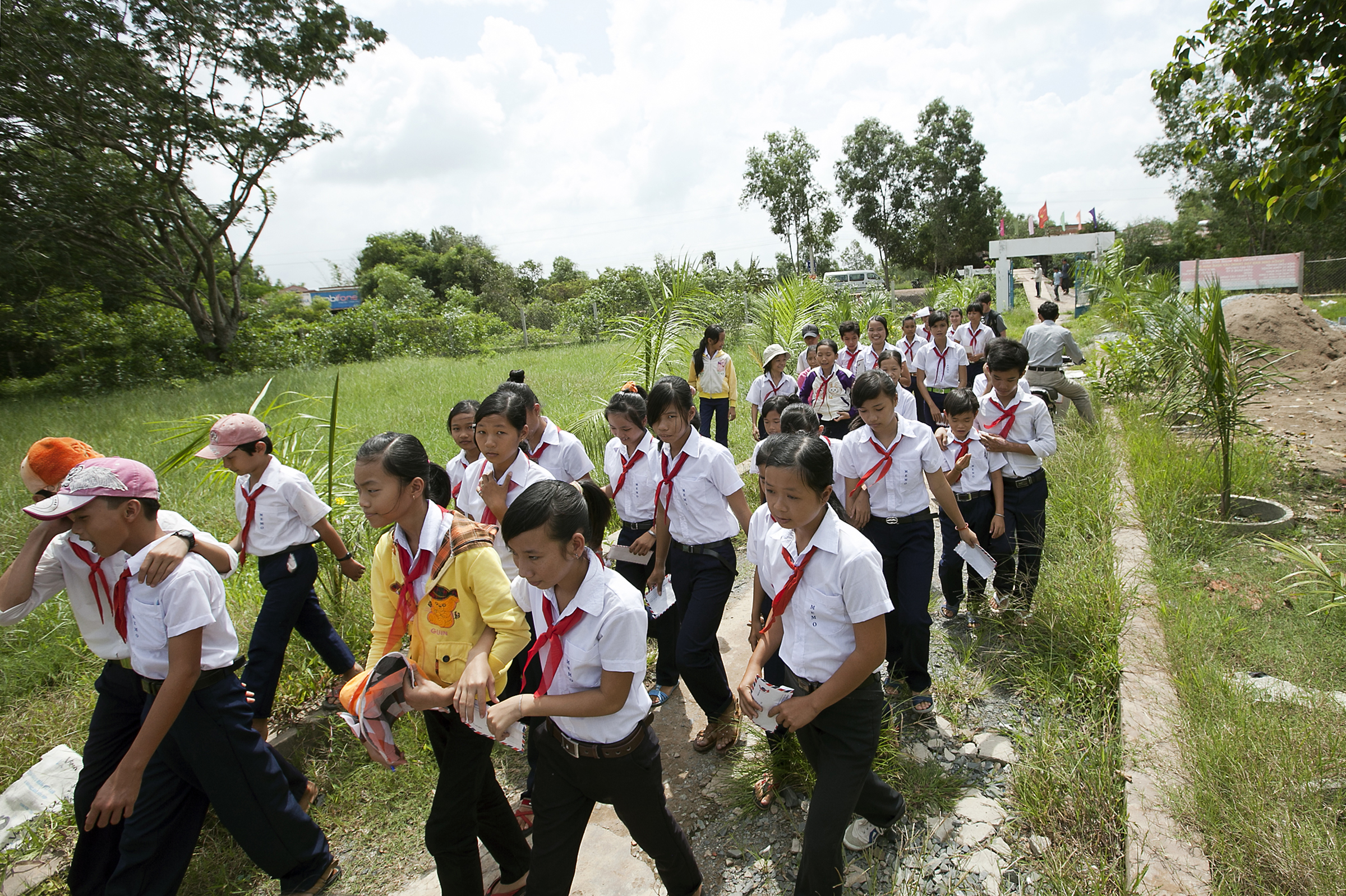
Students of Bình Hòa Nam Elementary, a rural school in Long An Province, wait to receive scholarships and donated school supplies from members of Medical, Educational Missions and Outreach, a UC student group that travels to Vietnam each year. MEMO has visited the same elementary school for the past five years.

HO CHI MINH CITY, Vietnam “”mdash; Inside the iron gates, uniformed schoolchildren line up on either side of a dirt path.
In the rural outskirts of the city, 50 students from Bình Hòa Nam Elementary greet their benefactors, 50 California college students.
A taller girl comes forward and welcomes them inside as the younger students fidget and try to stand at attention.
For five years, the UC Irvine and UCLA student group ““ Medical, Educational Missions and Outreach ““ has returned to this school to support high-achieving students of Bình Hòa Nam in Long An with scholarships to stay in school.
Throughout the year, MEMO raises money and collects donated medical supplies to use on a number of medical and educational projects. The group wants to foster sustainable change ““ or to “help Vietnam help itself” ““ and the best way to do that is through education, MEMO leaders say.
Provincial officials and MEMO hold a ceremony each year to award the students with $30 scholarships. Next semester, they’ll each receive a second sum of $30.
For the students, the money is a means to stay in school another year rather than work in the fields with their parents. For MEMO, it is a means to an end.
“(The scholarships) remind (the students) that we’re really proud of them. We’re not just some kids from America going back to give them rewards and leave,” said Tuan Nguyen, a fourth-year physiological science student at UCLA who emigrated from Vietnam to the United States at age 10. “It’s really tough to make a living in Vietnam, and the best way to get out of poverty is to pursue an education.”
***
At school on a summer day, some children sit attentively while others fiddle with the envelopes from last year’s MEMO scholarship.
“There are a lot of charity organizations who are really concerned about students and they try to give you wings so you can fly,” the ceremony’s emcee said.
Dr. Duy Nguyen, an Orange County doctor who helped create MEMO with his daughters, takes the podium. Long-Co and Au-Co Nguyen created the nonprofit MEMO at UC Irvine in 2007 and are now both in medical school, he tells the students in Vietnamese.
“Only knowledge can help you rise up in life,” he says. “We hope that you will be … studious and work hard to build up and develop the country.”
The students respond with polite applause. A student representative thanks MEMO with a promise.
“We promise we will try our best to study hard to show our gratitude to you and those in the organization who are concerned about us. Finally, we wish good health to all of you,” she trails off, trying to list everyone.
After the ceremony, the MEMO students typically linger to play and interact with the kids, but this year a sudden rain cuts the visit short.
A growing divide
The MEMO students have their work cut out for them.
Across the river, the country is ostensibly booming. Skyscrapers, billboards and factories compete for dominance in a bleak cityscape. Almost all the cars on the road are a new Japanese import. Yet just below these symbols of wealth live some of the country’s poorest. They peddle knock-off sunglasses, souvenirs and bottled drinks.
This was Tuan Nguyen’s city until he moved to Orange County when he was 10 years old.
His father was able to provide enough for his family, allowing Nguyen to attend elementary school, play video games and watch television.
“I guess I was lucky in Vietnam. … I wouldn’t have to worry about things,” Nguyen said. “It was “˜what will I eat tomorrow,’ not “˜will I eat tomorrow?'”
After moving to the United States, he kept learning about Vietnam ““ the language, the history, his people. At UCLA, MEMO was the best way for him to continue that mission.
MEMO’s first project was to provide scholarships for the children of Long An, after Duy Nguyen and his daughters saw the need for better education. Through the years, the group has evolved in its scope, bringing new technology to a now-leading hospital and free health clinics to impoverished rural areas.
“We just wanted to answer the need that we saw,” said Long-Co Nguyen, MEMO’s co-founder. “We were just filling in the holes.”
Many MEMO students are Vietnamese or Vietnamese-American and return year after year to help their country and to hear the stories of their people.
“I wanted to see it with my own eyes,” Tuan Nguyen said. “Ever since I’ve been back since last year, there’s still a lot of things I don’t know. Books can only say so much about a place or what the people go through on a daily basis. Only those people will be able to tell you.”
